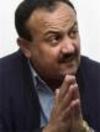It's been a pleasure guest blogging for Democracy Arsenal. I hope I've provided some insight into the question of democracy promotion in the Arab world, and Egypt in particular. For this, my last post, I want to just throw out a few disjointed, but hopefully useful, thoughts about the future of the Democratic Party.
For a while now, I've been getting increasingly frustrated with our party's approach to foreign policy. Let me just backtrack a little bit. I remember, last year during the election campaign, when John Kerry cited "stability" as our most important objective in Iraq. There was something disturbing about the idea that our soldiers were dying by the hundreds for "stability." For some it seemed a perfectly logical statement - yet more evidence that Kerry would be the safe, sober choice relative to the recklessness of George Bush and his coterie of war-crazed advisors. For others like me, we wondered, perhaps with looks of incredulity on our faces, how and when sobriety had become the revered hallmark of the Democratic Party. (Of course, stability is of vital importance. But one would hope that stability is not, by itself, all we are striving for in Iraq).
This otherwise unremarkable statement from John Kerry was evidence of the poverty of new, or even interesting, ideas in our party. It's become a cliche by now, but we're lacking the "vision thing." For all its faults, at least the Bush administration acted (or pretended) like it operated out of conviction and not calculation. When you listened to Bush speak about a variety of foreign policy issues, you got a sense that he was presenting a vision, however frightening that vision sometimes was. Ideology mixed with foreign policy can be dangerous (i.e. the last 5 years) but, then again, I suspect that few Americans have an emotional affinity for the dank grayness of realpolitik.
There doesn't seem to be even a trace of Woodrow Wilson in our Democratic leaders (Joe Biden is an exception that comes to mind). More often than not, we've avoided the issue of democracy promotion in the Middle East like it was some kind of partisan plague unleashed by Karl Rove. I dislike many things about Bush's foreign policy, but I - and I say this with a more than a hint of reluctance - really liked the language Bush used in his state of the union and inaugural addresses earlier this year. "All who live in tyranny and hopelessness can know: the United States will not ignore your oppression, or excuse your oppressors. When you stand for your liberty, we will stand with you," or "the road of providence is uneven and unpredictable, yet we know where it leads: It leads to freedom." It's unfortunate that these words, so long overdue, came from a Republican president. This used to be our issue. A passion for promoting freedom, democracy and human rights used to be what animated us and what drove us. This was the essence of what it meant to be a liberal internationalist. But now it seems that the liberals have turned conservative and the conservatives turned liberal.
It seems to me that a keen awareness of the West's often destructive role in the region coupled with well-deserved anger over the last 5 years of President Bush's messianic militarism has pushed many democrats to disengage from the noble and worthwhile venture of democracy building. In the process, the Democratic Party - which used to be most vigorous in its support of humanitarian intervention abroad - has ceded this crucial issue to the neo-conservatives.
So a few questions to all of you Democracy Arsenal readers and I'd love to hear your feedback: What do we believe in ? What are the ideas that guide us ? Will we be able to provide a bold, comprehensive vision for US foreign policy ? More importantly, what is our overarching theme, our message, our meta-narrative ?
Yes, I am a Democrat, and a proud one at that, but I have no problem saying that I hope that America's great project this century will be the unapologetic, vigorous promotion of democracy in the Middle East (note: this does not mean using military force). This is not so much a policy choice as it is a moral commitment. Moreover, it's an idea and it's a vision and, yes, it's also in our national interests. This was once also, long ago, our language - the language of Wilson, Roosevelt, Truman, and Kennedy. It is easy to forget it now, but the driving force of the Left has always been something much greater, and certainly more noble than "stability." Let us, then, work to reclaim that lost spirit.








